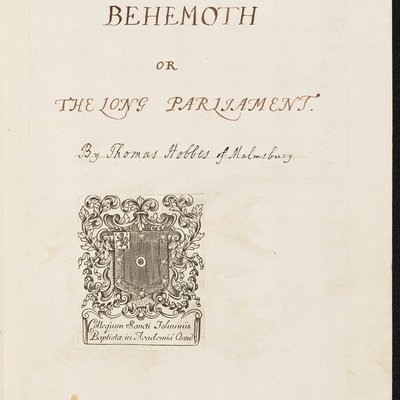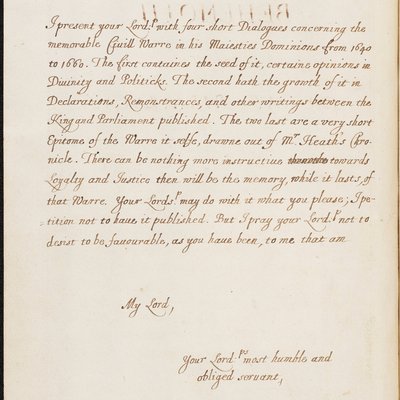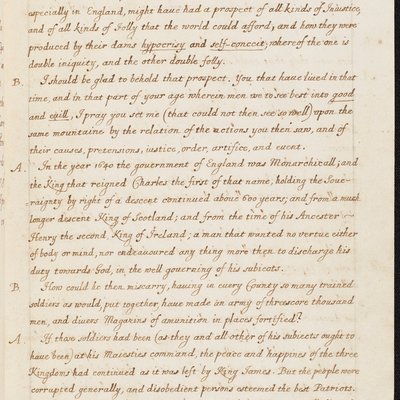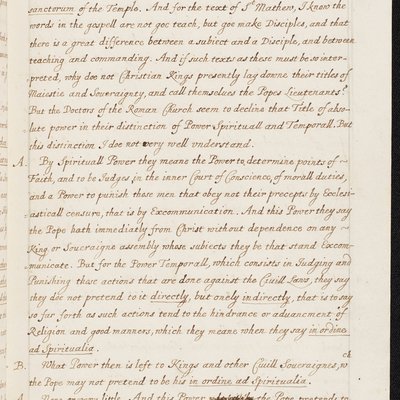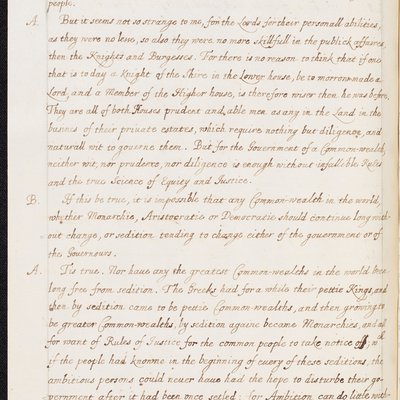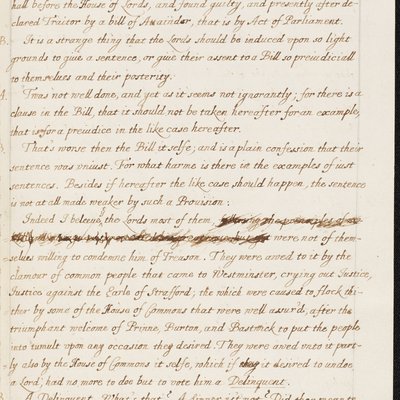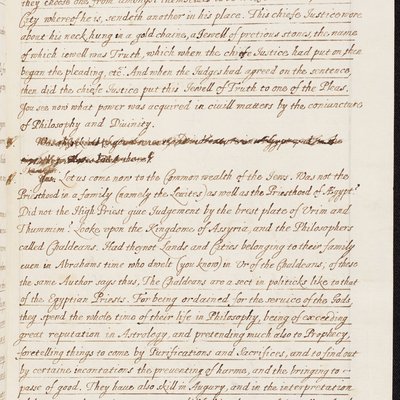January 2023
In Behemoth or the Long Parliament, the political philosopher Thomas Hobbes (1588-1679) discusses the English Civil War (1642-1651). Dividing the subject matter into four sections, called ‘dialogues’ in St John’s copy, Hobbes’s work covers the timespan from 1637 to 1660 (Seaward, p. 1). The dialogues cover the following topics (Wikipedia contributors):
- The causes of the civil war
- The preparation for the war on both sides
- The rise of Oliver Cromwell and the fall of Charles I
- Oliver Cromwell’s Protectorate, its demise under his son Richard, and the restoration of the Stuart monarchy with Charles II
Behemoth is Hobbes’s ‘only composition to address directly the history of the events which formed the context of his writings on sovereignty and the government of the Church, it closely reflects the personal and political uncertainties of the period of its composition’ (Seaward, p. 1).
St John’s manuscript, one of only seven still in existence (Seaward, p. 13), is a significant text witness of Behemoth and as such forms the base text for Paul Seaward’s critical edition published by Oxford University Press in 2010. This ‘presentation copy’ (Seaward, p. 13) was written down by James Wheldon, the steward of the Earl of Devonshire and Hobbes’s amanuensis, with whom Hobbes had worked before (Seaward, p. 72). Yet, it also includes corrections and deletions by Thomas Hobbes himself, such as ‘fo. 4r, on the jure divino powers of the bishops; fos. 33v–34r, on parliamentary assemblies and on the Lords and the impeachment of Strafford; and fo. 45r, on the government of Egypt in the time of Moses’ (Seaward, pp. 72-3).
Our manuscript was prepared for Sir Henry Bennet, Baron of Arlington, to whom it was dedicated, because as Secretary of State he was responsible for licencing ‘Books of History, Affairs of State, &c. (Licencing Act of 1662). It is not certain when exactly this copy was produced, but the work as such may have been written between 1666 and 1668 (Seaward, p. 70; cf. pp. 6-10).
We do not know much about the provenance history of MS 13, but in 1706 it was given to St John’s College by Charles Wheatly (1686-1742), who joined St John’s College in 1705 as a Founder’s Kin, aged 19. Was the manuscript in his family’s possession before? After his studies, Wheatly became an Anglican clergyman and liturgical scholar. His deleted ex libris inscription on the title page is followed by the College’s ex dono statement.
It was difficult for Thomas Hobbes to publish Behemoth. The king’s refusal to consent to its publication is well documented (Seaward, pp. 13-14). Indeed, this refusal appears to be the very reason why the copy now at St John’s was prepared in the first place. In any case, the Behemoth was first published without Hobbes’s approval before his death in December 1679 and then ‘officially’ by his publisher, the London bookseller William Crooke, in 1682 (Seaward, pp. 14-16).
MS 13 is the start of a special ‘Book of the Month’ year at St John’s College Library, which will focus on the volumes we will digitize over the next two years. With our preparations for the imaging phase of our Digitization Project having made great progress in the last quarter of 2022, MS 13 was the perfect manuscript to photograph first: It is in an excellent conservation condition and has a very sturdy binding, which allowed the book to open really well. The volume has no illustrations to be concerned about and the script was not going anywhere near the outer margin either. In addition to these practical concerns, it is a great representative of the treasures held at St John’s College, which we are delighted to make accessible on Digital Bodleian. An online catalogue for our Western early modern manuscripts, to which MS 13 belongs, is expected to go live in April 2023.
The digitization of MS 13 is now available here at Digital Bodleian.
Find out more about our Digitization Project in our blog posts at https://stjohnscollegelibraryoxford.org/blog-posts-digitisation-project/ and the Digital Library at https://stjohnscollegelibraryoxford.org/digital-library/.
References
- Hobbes, Thomas, Behemoth or the Long Parliament, ed. Paul Seaward, The Clarendon Edition of the Works of Thomas Hobbes, v. 10 (Oxford: Clarendon Press, 2010).
- Licencing Act of 1662 at https://www.british-history.ac.uk/statutes-realm/vol5/pp428-435 [accessed 5/12/22].
- Wikipedia contributors, ‘Behemoth (Hobbes book)’, Wikipedia: The Free Encyclopedia (revised 17 November 2022), at https://en.wikipedia.org/w/index.php?title=Behemoth_(Hobbes_book)&oldid=1122428401 [accessed 12/01/2023].
